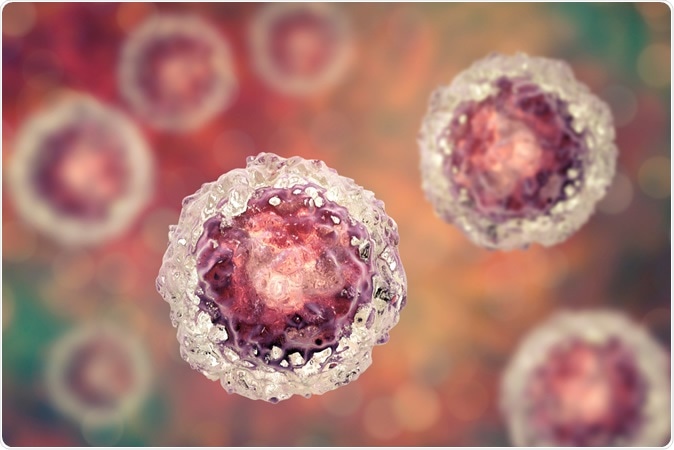The coronavirus disease (COVID-19) has ravaged across the, infecting more than 3.11 million people in just over four months. As the virus continues to spread, scientists are struggling to find an effective treatment for the infection. Now, a breakthrough discovery on stem cells could help in the battle against COVID-19.
What are stem cells?
Stem cells can divide for indefinite periods to give rise to specialized cells. The cells also serve as an internal repair system, dividing without limit to replenish other cells throughout the life of a human or animal. When these cells divide, each new cell has the potential to remain a stem cell or become a different type of cell with a specialized function, like a brain cell, a red blood cell, or even a muscle cell, among others.

Stem cells, 3D illustration. Image Credit: Kateryna Kon / Shutterstock
In some cases, stem cells can repair damaged tissues. Scientists across the globe believe that stem cell-based therapies may be used to treat devastating and debilitating diseases such as cancer and Alzheimer’s disease. Now, researchers are working on stem cells as a potential treatment for infections.
The only stem cells used in the field of medicine today are hematopoietic stem cells, which are the blood-cell forming adult stem cells found in the bone marrow. However, other stem cells are now being evaluated for medicinal uses.
Stem cells and COVID-19
Mesenchymal stromal cells (MSCs) are currently explored in many pre-clinical and clinical-based therapy studies. These cells have been a major focus of many scientists in the hopes of exploring their uses in disease modeling, pharmaceutical screening, and regenerative medicine.
The researcher suggests that using lung-specific mesenchymal stem cells can help treat patients infected with the severe acute respiratory syndrome coronavirus 2 (SARS-CoV-2), the pathogen that causes COVID-19 disease.
“This is not a COVID-19 vaccine, but a treatment for those who have already fallen ill. If we get the opportunity to quickly do clinical trials, we could potentially have a new treatment modality for patients long before there is a vaccine”, Niels-Bjarne Woods, head of the research group at the Department of Laboratory Medicine and founder of Amniotics AB, said.
In studies conducted on stem cells, the researcher highlights the promising results of lung-specific mesenchymal stem cells and how they can stem inflammation. These cells have also resulted in reduced lung tissue damage in a disease model of acute respiratory distress, a common complication of COVID-19.
Because of the promising results of the use of stem cells, the researchers who are working alongside Woods, plan to conduct a trial using the cells in patients who are critically ill with COVID-19. The use of these cells can help save not only the life of patients but also decrease the severity of the lung damage they suffered.
Amniotic collection device
The team of researchers based their study on a previous one, which investigated how to use mesenchymal stem cells from amniotic fluid. The study, which was published in the journal Stem Cell Research & Therapy in 2017, sheds light on how stem cells can help in the fight against the coronavirus disease.
The team used a newly developed amniotic collection device to get various cells. The mesenchymal stem cells contain unique advantages over other sources since they are faster to reproduce compared to adult tissue MSCs.
“During the late stages of pregnancy, amniotic fluid fills the lungs of the unborn baby. This has made it possible to develop the lung-specific mesenchymal stem cells, which may be important for treating lung disease. The key was to understand the biology of the cells to be able to isolate them from other cells present in amniotic fluid,” Woods explained.
The team proposes to use the cells in a clinical study, and if everything becomes a success, they hope the first batch of patients to receive the stem cell therapy against COVID-19 may commence in fall this year.
“We are also in talks with hospitals in other countries about using the lung-specific mesenchymal stem cells,” the team said.
Globally, the coronavirus disease has now spread to 185 countries, killing more than 212,000 people. The United States reports the greatest number of cases, with 989,357 infections and a death toll of more than 56,000.